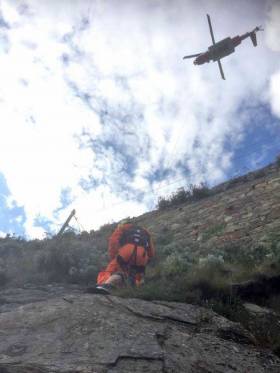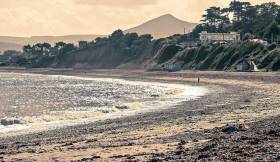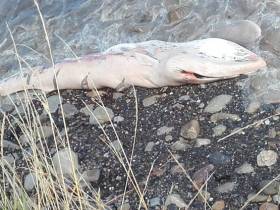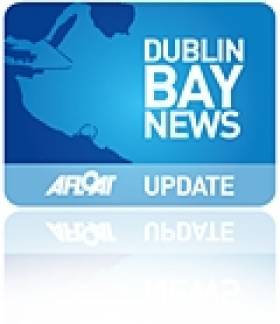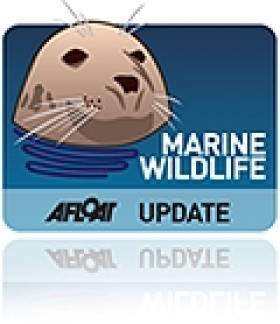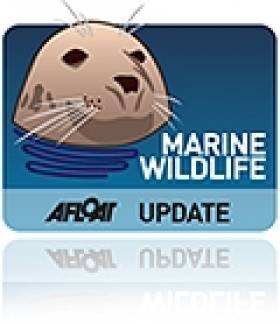Displaying items by tag: Killiney
Coastguard Rescue For Woman Stranded While Retrieving Drone From Killiney Cliff Face
#Rescue - Drone owners will be mindful of where they fly their devices after a woman was stranded on a cliff face in Killiney while trying to recover one of the mini aircraft.
Dublin MRCC received a 112 call on Tuesday (15 August) from a father whose daughter was stuck on the cliff at Whiterock, after she had attempted to retrieve the drone he had been test flying before it crash landed.
Dun Laoghaire Coast Guard were deployed to the scene along with the Dublin-based Irish Coast Guard helicopter Rescue 116. A request was also extended to the Greystones Coast Guard Cliff Unit to assist.
A Dun Laoghaire coastguard volunteer reached the woman, who had found herself stuck some 30 feet from the cliff base, and made her comfortable until Rescue 116 prepared their winch man to lower her to the beach below. No injuries were reported.
#Pollution - RTÉ News reports that a swimming ban was lifted yesterday on bathing spots at Seapoint and Killiney on Dublin Bay’s southern shore after high levels of E.coli were detected last Friday (30 June).
The bathing ban remains at Blackrock Baths pending the results of samples expected later today (Wednesday 5 July). Blackrock and Seapoint were subject to a similar ban for high E.coli levels back in January, according to TheJournal.ie.
More recently, the beaches at Dollymount and Sandymount were closed to swimming after heavy rains caused by a sewage spill in the River Liffey.
Public Warned Away From Killiney Minke Whale Carcass
#MarineWildlife - Dun Laoghaire-Rathdown County Council has warned the public to stay away from the carcass of a minke whale that has washed up on Killiney Beach.
According to TheJournal.ie, the carcass of the 13m female minke whale was seen floating off Greystones yesterday and Shankill earlier today (Friday 19 August).
In what's an unusual occurrence for the East Coast, the carcass has washed up on a rocky stretch made even more treacherous by high spring tides – and it may also pose a risk of infection to curious beachgoers.
#dlrcc is aware of deceased 13m minke whale at #Killiney beach. Public asked to avoid location until further notice. pic.twitter.com/9Bvw6kQQhS
— dlrcc (@dlrcc) August 19, 2016
#DublinBay - Four bathing spots in South Dublin have been temporarily closed to swimmers after water tests indicated levels of bacteria above the minimum health standards.
As TheJournal.ie reports, Killiney Beach will have its Blue Flag status suspended by Dun Laoghaire-Rathdown County Council pending the investigation into the high levels of E.coli and Enterococci detected in water samples taken yesterday (16 July).
The popular White Rock beach in nearby Dalkey has also been closed to bathers, while Dublin City Council has prohibited swimming at Sandymount Strand and the South Wall after its own water quality tests.
Waters at all four Dublin Bay locations have been resampled with results due tomorrow (Friday 18 July).
Bottlenose Dolphin Pod Seen Again Off Dublin Coast
#MARINE WILDLIFE - They were thought to have disappeared from the east coast in October after delighting wildlife enthusiasts in Dublin and Wicklow.
But concerns that one of the group had died were swept side when the pod of three bottlenose dolphins was once again spotted off Killiney recently.
The Wicklow People reports that the two adults and one juvenile reappeared almost two weeks ago, and have been seen daily "putting on great displays of leaping, breaching, and tail slapping".
Fears were that tragedy had befallen the group when two bottlenoses were seen off Skerries and Balbriggan in late October, and a juvenile was found dead in Portmarnock shortly after.
As previously reported on Afloat.ie, some 200 sightings of the dolphins between Dalkey Island and Wicklow town in recent months were validated by the Irish Whale and Dolphin Group (IWDG).
According to the IWDG, evidence suggests that the pod is now resident off the east coast.
The Wicklow People has more on the story HERE.
Watch Out for Dolphins in Dublin Bay!
Racers in Dalkey and Killiney Bay have been enjoying the sight of three bottlenose dolphins who have taken up residence in the area.
The trio has attracted much attention in recent weeks due to their playful antics, but the Dublin Bay Sailing Club reminds sightseeing boat owners to be careful not to crowd them.
For guidelines on the correct procedures when encountering dolphins see the relevant DTTAS Marine Notice HERE.


























